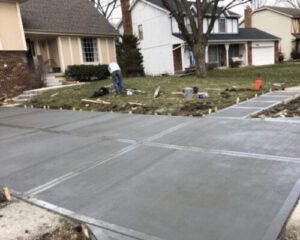Over time, your driveway is exposed to a variety of pressures that can degrade the surface. Cracks, stains, and potholes are all common issues that may warrant a new surface to avoid further damage and improve curb appeal.

Choosing the right material and hiring a qualified contractor can help homeowners get the most longevity out of their investment. But how can you tell if it’s time to replace your driveway? For professional help, contact Driveway Replacement Colorado Springs.
The cost of driveway replacement varies by location and materials. Installation costs are higher in major cities due to material delivery expenses and higher labor rates. The cost of a driveway can also increase if the contractor is installing it on a slope or dealing with landscaping or drainage issues.
Asphalt is the most popular and affordable choice, but it isn’t as long-lasting as concrete. The average lifespan of an asphalt driveway is 15 years, which means homeowners will need to replace it more frequently than a concrete or gravel option.
Gravel is a less expensive option, but it requires more maintenance. It needs to be regularly swept and rearranged as rain, wind, and cars move the pebbles around.
Recycled rubber is another alternative to consider. It’s a fairly new material that’s eco-friendly, but it has a short lifespan and may require additional repairs or replacement sooner than other options.
Other costs to consider include the removal of the old driveway, excavation, grading, and site preparation. Removing the old surface and hauling it away typically adds $1 to $3 per square foot to the overall cost of a project. Site prep can cost $5 to $8 per square foot and ensures the site is stable and the driveway allows water to drain correctly.
Other repairs or upgrades that can be added to the original project include adding borders featuring stone or brick pavers, adding rebar for strength, and adding a turn-around at the end of the driveway for easier access to the street. Finishing touches include pigmented or acid staining and adding a stamp to the surface. Homeowners can save on the initial project costs by purchasing their own materials or coordinating with neighbors to purchase in bulk and share the cost of supplies. Getting estimates from multiple contractors is the best way to get a realistic idea of how much the job will cost.
Materials
The materials you choose for your driveway have a big impact on its cost, durability, and appearance. Driveway construction materials must be able to support the weight of vehicles as well as withstand moisture and other environmental factors for decades at a time. This makes the choice of material a complex one, especially because it needs to be weighed against other factors that might affect your home’s aesthetic and resale value.
The first thing to consider is the type of driveway you want. There are several popular choices, each with its own benefits and drawbacks. Asphalt, for example, is quick and affordable to install and can last 20 years with regular maintenance. On the other hand, it can soften in extreme heat and be damaged by tree roots. Concrete is another option, but it requires a lot of time and money to install and is also vulnerable to cracking.
You can also find gravel, cobblestone pavers, and interlocking concrete pavers for your new driveway. Gravel is cheaper than paved options, but it can be unstable and create ruts and mud holes that need to be refilled regularly. Cobblestone pavers offer more stability than loose gravel and can be very attractive when arranged in ornate patterns. Interlocking pavers like those from TRUEGRID offer a durable alternative to traditional asphalt and concrete in terms of cost, ease of installation, and durability. These are particularly good choices for environmentally conscious homeowners, as they are permeable and don’t add to drainage problems.
Brick is another option that provides high durability and visual appeal. It is a common choice for historic homes and can last a lifetime, but it does come with a higher upfront price for the materials and labor. You can also find pavers and clay bricks in a range of colors, and they can be arranged in different ways to create unique designs.
Curb Appeal
The word “curb appeal” may seem like a buzzword used by real estate agents to attract buyers, but it is a very real factor when it comes to your home’s value. Studies show that a home with attractive curb appeal will sell for up to seven percent more than a similar property without good curb appeal. Thankfully, you don’t need to spend a fortune to boost your home’s curb appeal. Many small projects can be done for a day, a weekend, or even just one month to improve the curb appeal of your home.
The easiest and most obvious way to improve your home’s curb appeal is by planting flowers or other vegetation. Colorful flowers and bright green grass will instantly make your property look more appealing to people passing by. It doesn’t matter if you have a large backyard or a small front yard; planting a few plants or flowers can really make a difference in your home’s overall appearance.
Another great way to add to your home’s curb appeal is by removing any dead or overgrown plants around your property. Overgrown plants can create a messy appearance that makes it look as if the home is neglected. Also, if you have an overgrown tree near your house, it can potentially cause damage to the roof or foundation of the house, which is not something you want.
In addition to removing any dead or overgrown plants, you should also make sure your lawn and other landscaping is neatly mowed and maintained. Having overgrown or patchy grass will make your property appear messy and uncared for, which will not appeal to potential buyers. Also, be sure to regularly water your plants and mulch the soil to keep it healthy and looking its best.
Lastly, you can improve your home’s curb appeal by adding some exterior decorations. Things like hanging baskets of flowers, a wrought iron fence, or a new mailbox can add a touch of class and elegance to your home’s exterior. These simple upgrades can make a big difference in your home’s curb appeal and increase its overall value.
Maintenance
A driveway doesn’t last forever, but good maintenance practices will extend its life. Keeping up with minor repairs will help prevent them from becoming major issues that may lead to a replacement.
Asphalt and concrete are very durable, but even these materials have their limits. Typically, you’ll need to replace an asphalt driveway after 20 years and a concrete one after 25 years. But there are other factors that can affect the lifespan of a driveway, including the amount of traffic and its location.
If you have a dirt driveway, it can be washed regularly with a hose to remove organic debris that could cause discoloration. Adding a wood chip border around the driveway will also help protect the surface from erosion. For a smooth surface, it’s important to keep up with small crack fillings and sealant applications.
Larger cracks and holes may require a more extensive repair. These can be a sign of water infiltration, which is a problem for all driveway surfaces. Water can erode the material and shift it over time, especially in colder climates where freeze-thaw cycles occur. It can also carry debris that encourages weed growth, which will further deteriorate the material.
Repairing a damaged driveway may involve milling and installing new layers of asphalt or concrete, which will add to the cost of the project. However, most contractors can fix these problems with a combination of methods and materials.
For example, an asphalt contractor can use a hot rubberized material to fill in the cracks. In some cases, they can even resurface the entire drive using a broom finish.
When hiring a pro, make sure they use high-quality materials to avoid any future issues. Ask for photos of their previous work, and be sure to select a professional who will stand by his or her work. In addition, be wary of any deals that seem too good to be true. This can indicate poor-quality workmanship and shorten the life of your driveway. You can also ask a potential pro for references and a warranty. By taking these steps, you can be confident you’re getting the best quality and value for your money.
